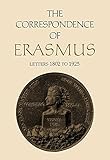The Correspondence of Erasmus : Letters 1802 to 1925 / Desiderius Erasmus.
Material type: TextSeries: Collected Works of Erasmus ; 13Publisher: Toronto : University of Toronto Press, [2010]Copyright date: ©2010Edition: ‹Volume 13‹/p›Description: 1 online resource (624 p.)Content type:
TextSeries: Collected Works of Erasmus ; 13Publisher: Toronto : University of Toronto Press, [2010]Copyright date: ©2010Edition: ‹Volume 13‹/p›Description: 1 online resource (624 p.)Content type: - 9780802090591
- 9781442698444
- 199/.492
- PA8502.E5 T5 1978 v.13
- online - DeGruyter
| Item type | Current library | Call number | URL | Status | Notes | Barcode | |
|---|---|---|---|---|---|---|---|
 eBook
eBook
|
Biblioteca "Angelicum" Pont. Univ. S.Tommaso d'Aquino Nuvola online | online - DeGruyter (Browse shelf(Opens below)) | Online access | Not for loan (Accesso limitato) | Accesso per gli utenti autorizzati / Access for authorized users | (dgr)9781442698444 |
Frontmatter -- Contents -- Illustrations -- Preface -- Map showing the principal places mentioned in volume 13 -- The Correspondence of Erasmus Letters 1802 to 1925 -- 1802 / From Maximilianus Transsilvanus – 1814 / From Juan de Vergara -- 1815 / To Mercurino Arborio di Gattinara – 1844 / To Nikolaus von Diesbach -- 1845 / From Johannes a Mera – 1874 / To Alonso de Fonseca -- 1875 / To Juan de Vergara – 1895 / From Andrzej Trzecieski -- 1895A / To the Pious Reader – 1925 / To the Nuns of Denney -- Table of Correspondents Works Frequently Cited Short-title Forms for Erasmus’ Works Index -- Table of Correspondents -- Works Frequently Cited -- Short-title Forms for Erasmus’ Works -- Index
restricted access online access with authorization star
http://purl.org/coar/access_right/c_16ec
The letters in this volume cover Erasmus' correspondence from March to December 1527. These 129 letters centre primarily on Erasmus' continuing struggle with his Catholic critics, especially those in Spain and France, and on Erasmus' growing criticism of the Protestant reform movement.The letters show Erasmus' attempts to justify his position and to win favour with rulers, other prestigious men, and powerful institutions, all influential in both secular and religious spheres. Although the Inquisition in Spain investigated his orthodoxy and did not bring charges against him, the Paris Faculty of Theology formally condemned 112 propositions drawn from Erasmus' works in December 1527. The letters in this volume, written by and to Erasmus in this critical time, represent a unique view of a Europe torn by war and breaking apart into religious confessionalism and regionally organized churches.Throughout all this controversy, Erasmus repeatedly protested that the sole aim of his life's work was to promote the study of humanities for the profit of both knowledge and religion.
Mode of access: Internet via World Wide Web.
In English.
Description based on online resource; title from PDF title page (publisher's Web site, viewed 01. Dez 2023)


